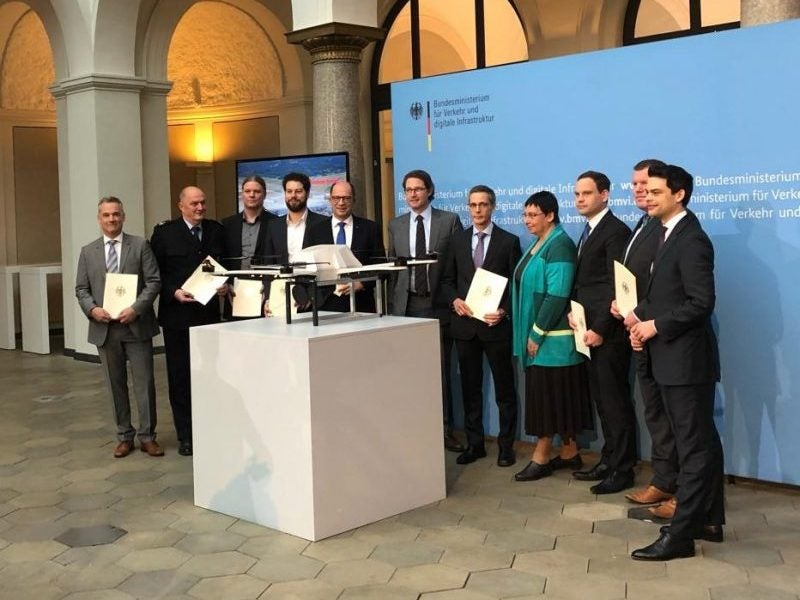German Federal Minister Scheuer has awarded the funding agreement for the research project FALKE to Frequentis Comsoft managing director Thomas Hoffmann, representing the Frequentis Group.
Drones or unmanned aerial systems (UAS) in controlled zones are an increasing threat to the seamless operations of airports. Last year, a high number of interferences were reported within the vicinity of German airports, operated by air navigation service provider DFS (Deutsche Flugsicherung).
FALKE is the German abbreviation for the ability to intercept small aircraft that enter restricted airspace. The goal of the FALKE project is the development of a deployable counter UAS system, proven in the airport environment. Alongside the Frequentis Group, other partners in the project consortium include the German Federal Police, DFS, Lufthansa, Hamburg Airport, the Hensoldt group, and the chair of electrical measurement of the Helmut-Schmidt University (HSU) in Hamburg.
Using Hamburg Airport as an example, the partners will develop and demonstrate a technical and organisational over-all concept to defend against illegally operating drones. By taking into consideration all areas of responsibility, FALKE will provide standardised and automated solutions to make the concept a blueprint for other airports. This concept will enable airports to face incidents, like those that took place at British airport Gatwick, swiftly and effectively.
FALKE provides the missing link between all relevant stakeholders (airport, police, air traffic control, airlines), existing infrastructure (air situation, air traffic management, ground situation police), and new systems (UTM, drone detection) making it possible not only to detect drones, but also to distinguish cooperative from noncooperative drones. Air traffic control will be supplied with safety alerts in relation to the current air situation. The ability to intercept drones that enter restricted airspace will make it possible to scale future technologies for drone detection and to optimise the cooperation and communication of stakeholders to guarantee a common understanding of the air situation.
The involvement of all relevant stakeholders at the airport, coupled with the system competence of the industrial partners and the expertise of the HSU, the project will significantly enhance the safety and security at the airports and enable a reliable detection and defence against drones that threaten safe flight operation.
Frequentis and Hensoldt will combine their competences to contribute their expertise. Frequentis Comsoft, together with the Frequentis Group, will provide mature components in the areas of UTM/ATM/drone detection, data fusion and exchange (MosaiX SWIM), shared situational awareness and ATM-grade surveillance data automation (SDDS-NG, MSDF, PRISMA), cross-agency incident management (ICM), as well as operational requirement analysis (Control Room Consulting). The Hensoldt group will bring in their sensor solutions (XPELLER, SPEXER), effector and drone defence technology (XPELLER, VADR).
“Our solutions facilitate an efficient drone defence in the airport environment. For the first time all stakeholders responsible for the safety of flight operation at airports will be supported in the event of threat scenarios, allowing them to make their decisions swiftly and efficiently based on validated, reliable information,” says Thomas Hoffmann, managing director of Frequentis Comsoft GmbH.


